Even if you’re a very new traveler, or have special needs, you’re going to find NZ a pleasure.
- It’s first world
- English speaking
- Accessible in most places for wheelchairs
- Sign-language is an official national language, so many people speak some
- It is a virtually GMO free country, with excellent food labeling systems for people who have allergies or intolerances.
- There are loads of playgrounds and skate parks in even the smallest towns
- Children’s menus and pricing are ubiquitous
- It’s compact and easy to get around, so in even a few weeks you can see a lot
- Most museums are free, or by donation, which stretches the budget and the learning
- It’s very safe, there’s nothing poisonous, you don’t need special vaccinations
- It’s a very open, tourist-friendly culture
This is also a country made to be driven. If you come here and don’t hire a car and hit the roads, you’ll have missed some of the best the country has to offer. The cities (small by international standards) are wonderful, but it’s the countryside and the small towns that hold the real charm and the real adventure.
Here’s why:
If you google “camper vanning New Zealand” or some such, what will come up is a long list of camper van and RV hire sites. Everything from the more than a little dodgy “Wicked” vans to the very efficiently marketed “Jucy” fleet, to the big “Kea” and “Apollo” RVs (which is what we would have needed for our family of six with big kids.)
Knowing that the best way to see this country is by camping, it’s really tempting to hire a van. We know lots of people who have, with varying degrees of happiness with the service and results. It doesn’t seem like it will be *that much* more expensive than staying in a hotel, perhaps it will even be cheaper if you are used to staying in nice places and you’re only coming for a couple of weeks.
But, there are a few myths to be debunked here:
Debunking the myths
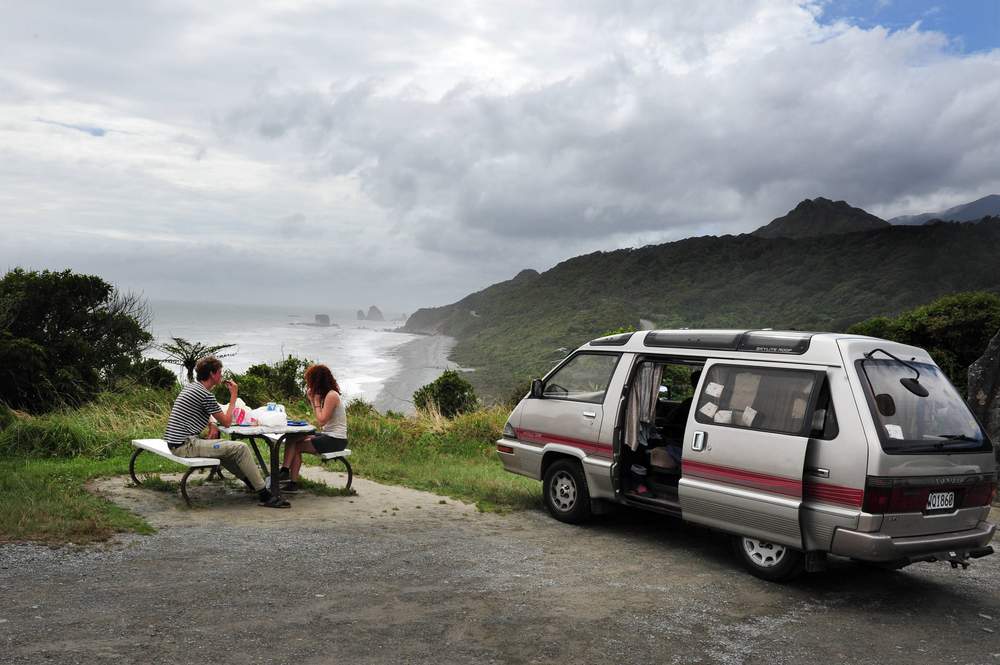
Renting a camper van or RV in New Zealand is NOT CHEAP
Factor in the cost of gas (currently $1.96/L or $7.84/gallon) or diesel ($1.18/L or $4.72/gal) but with diesel there’ll be a tax surcharge which levels the playing field.
With a rental you can expect to be paying for camping 80% or more of the time. If there are two of you, you might find campsites for as little as $20-30 a night, for our family of 6, we averaged $80 a night if we had to stay in a campground. Camping is charged by the head almost everywhere outside of North America.
If you are from a righthand drive country there may be insurance differences.
We started planning in July for our February arrival in NZ, we researched every rental option. I pitched several of the companies that have rigs big enough for our brood, hoping to make a deal for product review and promotion to reduce the cost for a six month stay. The very best deal we were able to cut, off season (winter in the southern hemisphere) with a reduction in rate for a long term rental, and my ability to write on the company’s behalf… are you ready? $24,000NZ. You read that right. Twenty four thousand dollars for six months. Before gas. Before camping fees. Before feeding the kids.
We laughed.
The buy-sell flip
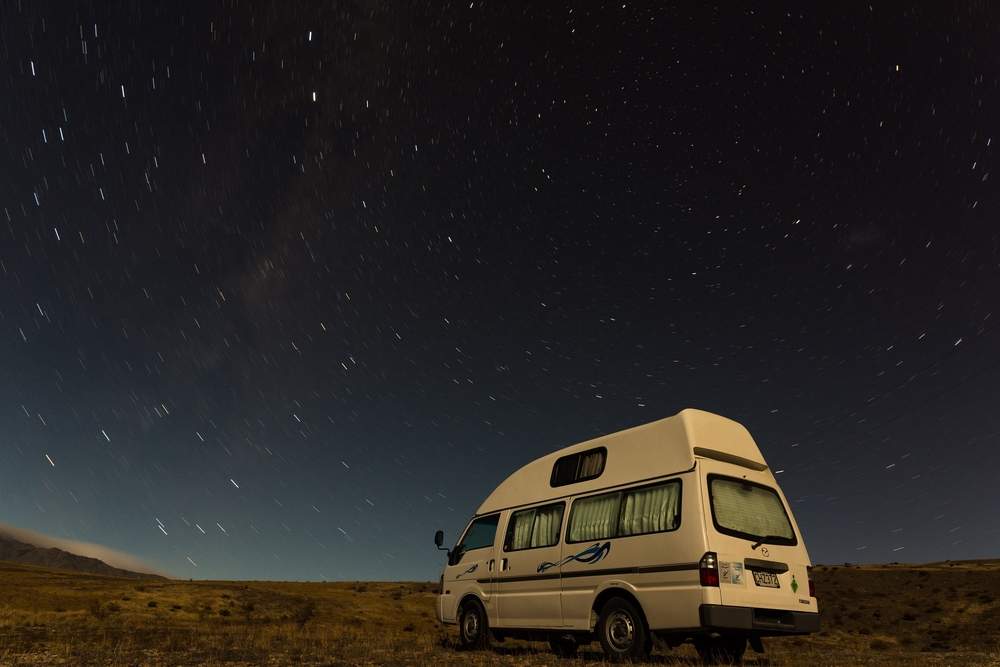
This is relatively easy to do, and there are tons of sites and businesses in NZ that are dedicated to exactly this action. The big cities all have camper van trade marts where you can go and pick up a dandy for not a lot of money. When you leave the country, you leave your van in the hands of one of these places, they sell it for you and take a cut. Easy peasy.
Trademe
The catch: you cannot bid or buy from outside NZ.
We set up an account and could look all we wanted, but were shut down instantly when we tried to contact sellers from outside NZ (we were in Thailand). If you have a contact inside NZ who can login to your account and make those contacts for you, it can work beautifully.
In our estimation, if you are staying more than a month, we would highly recommend you consider the buy-sell flip over the rental option.
Private Rental
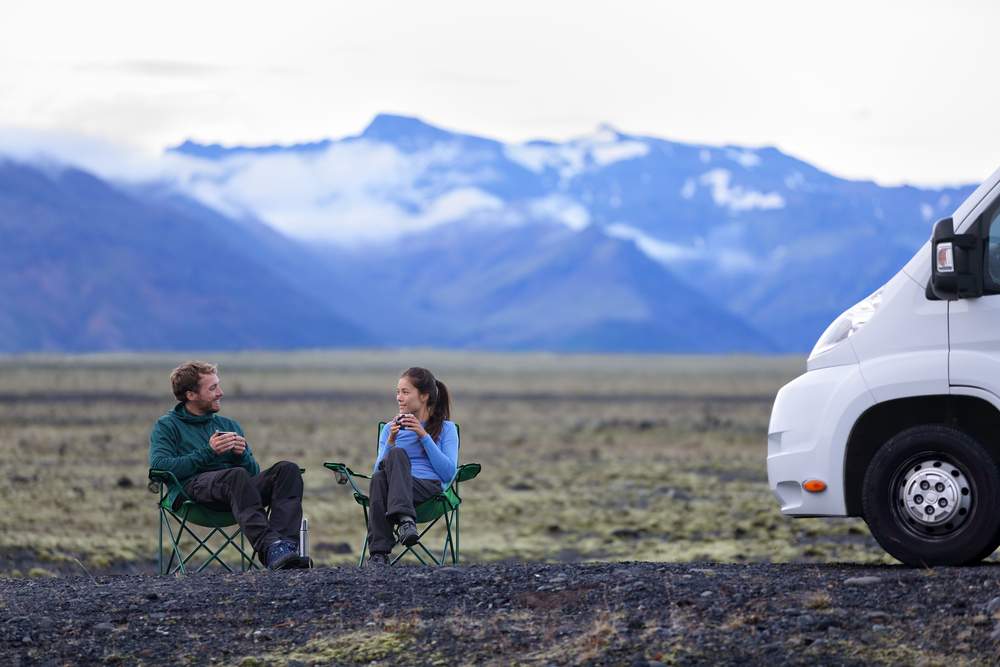
So we found our rig on TradeMe. It didn’t sell, we noticed, twice. With a friend’s help we contacted the owner and started talking about buying it for a rate lower than what he was looking for on the auction site, planning on a buy-sell flip.
Then it occurred to us that there was another option:
Tony low-balled the guy with an offer to rent it from him for six months instead of buying it outright. As it turned out, this suited him perfectly, as he didn’t really want to sell it, but needed to get it out of the yard, which we were happy to do for six months. Everyone wins!
Seems easy enough, right? It is! There are, however, a few considerations that we waded through the hard way just so you don’t have to:
Insurance
The buying process is a piece of cake
Registration
Considerations when choosing a vehicle in NZ
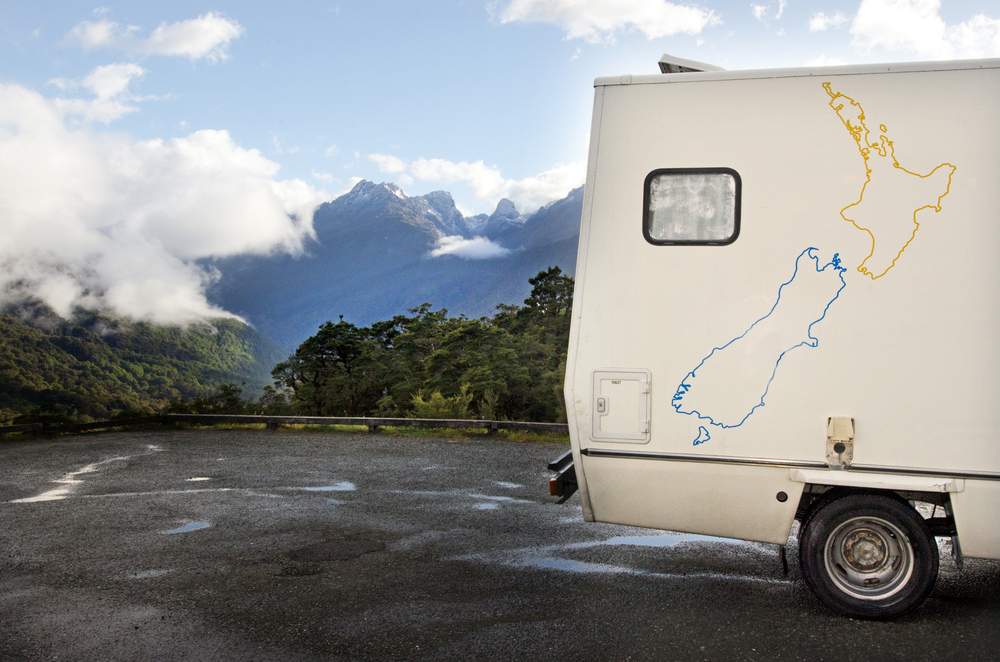
WOF
If your vehicle does not have this, don’t even consider it. Period. If it expires while you have the vehicle, you will have to have the WOF done and any necessary repairs made, to keep it legal.
WOEF
Make sure your camper has this. Ours did not. We learned the hard way and had to pay well over $100 by the time all was said and done to get it done, about two weeks into our journey… after a campground turned us away.
Self Containment Certification
Diesel Considerations
If you buy a diesel vehicle, plan for this. There are hefty fines for NOT having this up to date. It is still quite a bit cheaper to run a diesel vehicle than a petrol one.
Insurance
Do your shopping, but we found the best company for insuring an out-of-country driver was Cobi. There is a substantial discount if you are an NZMCA member (more on this later).
INSURE THE CONTENTS OF YOUR VEHICLE– this is a rider, it’s not expensive, but it makes all the difference if your van is broken into and something is stolen. OR… if something breaks. Our kids spilled a glass of water on a computer and drowned it while we were camped in Wanganui. This rider covered a brand new Macbook Pro. It’s worth it.
Why you want to join NZMCA
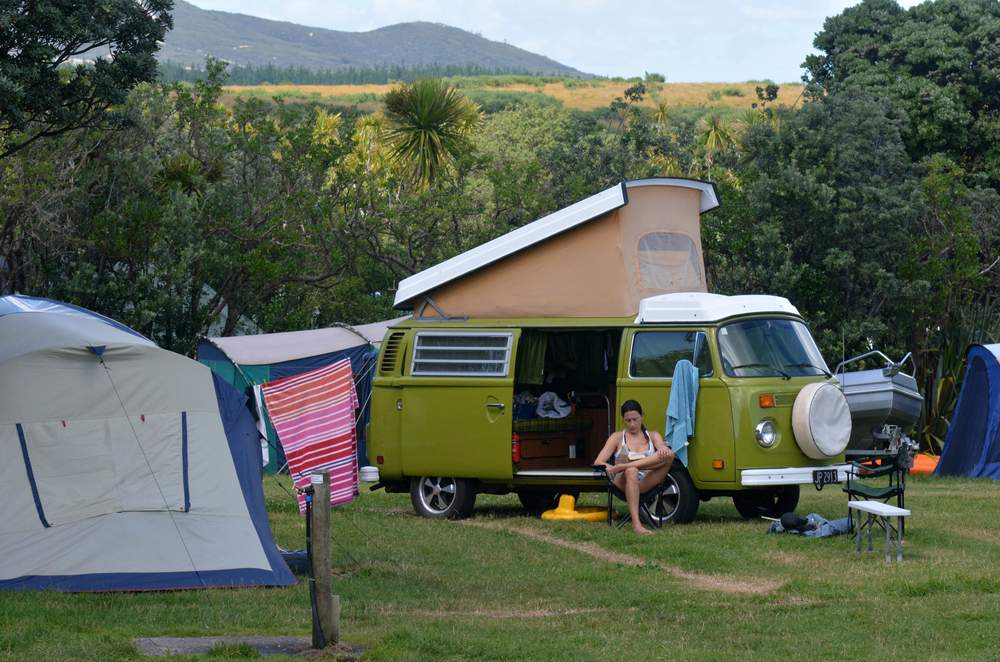
Here’s the big thing:
It also has a list of all public dump stations, which is key.
Every listing includes GPS coordinates, members can download GPS files from the website.
Daily Considerations Camping in NZ
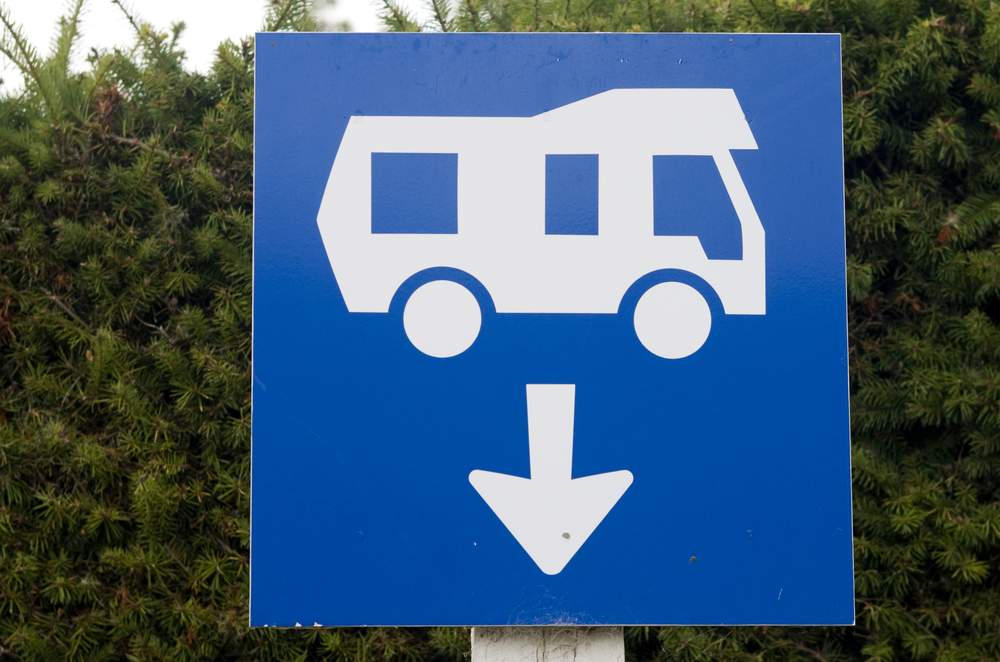
Dump Stations
If you dump anywhere that is NOT an approved dump station, you may be heavily fined and there will be a special circle of hell reserved for you. It’s just not cool. This is the primary reason that there is very little free camping in NZ now, as opposed to ten years ago.
Showering
The solution is simple, but easily overlooked: Pull into a dump station that also has fresh water, fill your fresh tank, take three showers. Dump your grey water. Fill your fresh tank: take three more showers. Dump and refill again and you’re on your way.
Groceries
There are many fruit and veggie shops that have excellent and inexpensive produce. Look for these and load up. Roadside vendors are even better.
Connectivity
Don’t expect free wi-fi anywhere. McDonalds has it and libraries have it but it’s often so slow that it’s pretty much unusable for any real work. If you are traveling you’ll be using cell phone data plans.
There is a massive difference between the availability on the North and the South Island. The vast majority of the population is on the North Island, connectivity reflects that. The exception: Dunedin. They have a great city-wide free wifi network.
Campground Comparisons
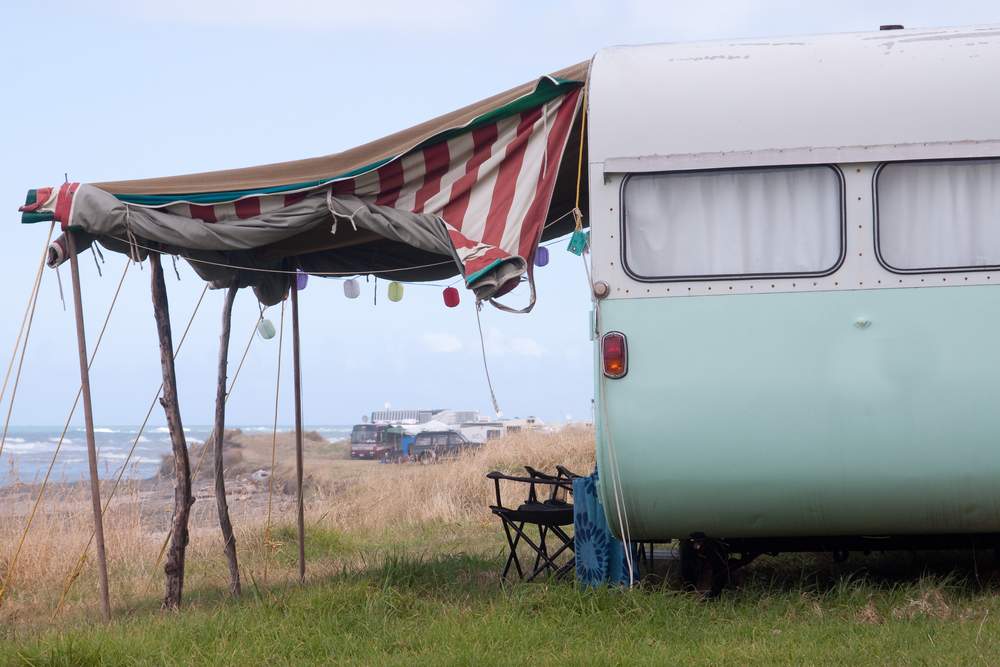
TOP10 Holiday Parks
Pros:
- They are clean
- Reliably consistent (they’re a chain, after all!)
- Big kitchens and lounge areas
- Excellent wifi (this is on purpose and chain wide, so if we REALLY have to have good wifi we know we can get it here)
Cons:
- Expensive
- Nickle and Dimey (everything costs extra, even pots and pans in the kitchen)
- Tend to be full of tourists who are responding to the ads
Mom & Pop Campgrounds
Pros:
- Local feel and local people
- The extras are often free (showers, kitchen equipment, sometimes even laundry, homemade bread or eggs!)
- More likely to be filled with Kiwis holidaying
- MUCH cheaper than the TOP10 parks most of the time
Cons:
- You never know what you’re going to get
- Don’t expect good wifi
- Finding them can be an adventure
For comparison’s sake, the best TOP10 park we stayed in was the Shotover TOP10 Holiday Park in Queenstown. It is blissfully out of the crazy city center. It’s well run, we needed great wifi for work that week and we had it.
We also had a beautiful room with a fireplace to work in, a playground for the kids, and it had free showers. We stayed almost a week and we loved it. Rack rate for our family would be $115 a night at the time of this writing.
The best private campground we stayed in was Waitaki Waters Holiday Park, near Oamaru. Derek Chapple is a stand up guy who is committed to doing this campground thing right! He’s won awards for his work from AA (the NZ travel gods.)
We were walking distance from the beach and great fishing, there were two fantastic, fully stocked kitchens, showers were free, even laundry was free (we left a donation) and the per night cost was $25 for our entire family.
Ferry Crossings
The NZMCA will provide a substantial discount. You can book online, or you can just roll up to the docks and make your reservations for the next day in person. There are often “deals” on the two competing ferry company websites. In general it’s cheaper to sail at night, but prettier during the day.
Questions?
- Nine New Zealand Wine Regions You Should Know About
- Incredible Cultural Experiences in Australia and New Zealand
- Eight Ways to Go Downhill in New Zealand
- Seven Stunning Lakes of the South Island of New Zealand
- Alcohol and Adrenaline: A Match Made in Heaven
Photo credits: Curioso , Maridav , Shanti Hesse , Patricia Hofmeester , ChameleonsEye , S Curtis , ChameleonsEye , ChameleonsEye
